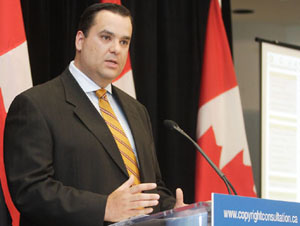 |
| Minister of Canadian Heritage James Moore discusses the new legislation (Government of Canada) |
To say that Canada’s copyright legislation is a little out of date might be an understatement. Last revised in 1997, it contains references to flip charts and overhead projectors but nothing about MP3s, video files or much of the digital content that’s defined copyright debates over the past 15 years.
Graham Reynolds, assistant professor with the Schulich School of Law, has been closely following efforts to update Canada’s legislation. His expertise is in copyright and intellectual property law, and he says that changes to Canada’s laws are well overdue.
“People have come to realize that copyright laws affect what they do on a daily basis, from copying a CD to how students go about doing academic research,” he says. “The shift to a digital world means that a copy is being made almost every time you do anything on a computer. Copyright law is implicated in every aspect of this process.”
The federal government appears to be on the verge of addressing this shift. After previous attempts to revise Canada’s copyright laws were abandoned when minority governments fell in 2005 and 2008, Bill C-32 was tabled in the House of Commons on June 2 after months of consultations.
Of the changes proposed, one of the most significant is the extension of what’s known as the “fair dealing” defence to copyright infringement to include protection for parody, satire, and education. This extension gives individuals the right to use a substantial amount of copyrighted material towards these ends without permission of the copyright owner – say, for example, using a movie or song in a classroom or creating a parody of a music video - provided that the copyrighted material was dealt with “fairly”.
“This potentially opens the door to a lot of exciting uses of works being lawful that may have been seen as infringing copyright under the current Act,” says Mr. Reynolds.
He’s also impressed with the proposed change allowing individuals to use copyrighted material in the creation of user-generated, non-commercial content, such as uploading a personal video to the web with a pop hit playing in the background, or making your own mashup song and sharing it online. As long as it isn’t seen as having a substantial adverse effect on the original work, these sorts of activities will now be allowed in Canada if the legislation is passed.
But Mr. Reynolds considers the bill flawed because of the way in which it protects technological protection mechanisms, sometimes referred to as “digital locks.” In a nutshell: If a copyright owner puts a digital lock limiting access to copyrighted work, it will be illegal to break that lock for all purposes (minus a few narrow exceptions), even if the intended use of the work – such as education – would otherwise be authorized under the law.
“It’s concerning in that creators, consumers and innovators – and students in research, for that matter – could be found to have committed an offence in the process of doing something which they otherwise have the right to do under the Copyright Act,” says Mr. Reynolds. “It could have implications for creative expression, research and the way consumers use content.”
He’s not alone in his opinion – noted digital rights voices such as Michael Geist of the University of Ottawa, as well as the Canadian Consumer Initiative, also believe that placing the copyright owner’s right to lock down their content ahead of the consumer’s right to fair dealing is a mistake. However, the Canadian government is under pressure from media companies, as well as governments in the United States and Britain with similar legislation, to keep the digital lock provisions in place.
Though he’s hoping that consumer pressure leads to the modification of provisions dealing with digital locks, Mr. Reynolds says that otherwise there is plenty to admire about C-32.
“If this one aspect of the bill is changed, it really can be seen as a move towards a more balanced copyright regime that reflects consumers’ interests,” he says. “It gives individuals a lot of freedom to be able to use information in education. That’s something very positive.”
You can read more of Mr. Reynolds' thoughts on Bill C-32 at The Mark.
